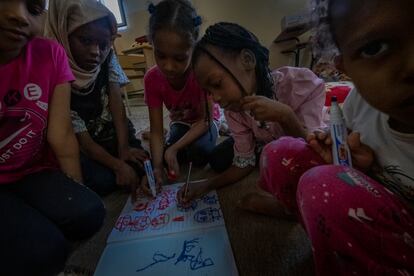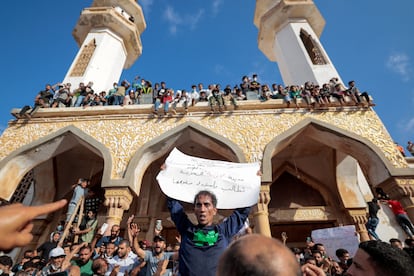After three wars in a decade, Derna experiences its toughest moment yet
The inhabitants of the Libyan city devastated by Storm Daniel have survived the overthrow of Gaddafi, Islamic State, and the conflict between parallel governments for control of the country
“Since 2011 everything has been getting worse. We have been suffering through crises and wars for more than a decade.” Samia is keen to talk. While most of the women refugees at this school on the outskirts of Derna — the Libyan city devastated last week by Storm Daniel — don’t want to be interviewed or photographed, Samia answers every question at length. She says she wears a niqab to cover her face because she lost her hair during the war against Islamic State that raged in Derna in 2016.
“With the bombings, I got sick. I got white spots all over my body like the ones you see on my hands, and I became hairless. There is no treatment for my illness here,” she explains, sitting on a child’s chair, while a dozen women who, like her, lost their homes to the flooding in Derna a week ago listen to her attentively. They are in one of the shelters that the government of Field Mashal Khalifa Hafter — the military officer who commands the Libyan National Army (LNA) and controls the eastern part of the country — and various social organizations have set up to provide shelter. Women have hardly been seen on the streets of the city since he arrived.
“In 2011, bullets were flying over our houses and we still had to go out to find something to eat,” Samia says, referring to the popular uprising that would lead to a civil war that — with NATO support for the National Transitional Council — brought down the regime of Muammar al-Gaddafi. Two years later, in 2014, in the face of the failure of the parties that had contested the elections to form a government, parallel administrations were installed in Libya that remain in operation today, with both backed by foreign nations waging their geopolitical struggles at the expense of the Libyan people.
In late 2014, Islamic State (Daesh) took advantage of the power vacuum to occupy several towns and cities, including Sirte and Derna. “There were bombs falling all around us. We women had to be covered; we could only go out on the street if we were with a man. Daesh soldiers surrounded our neighbors’ house, killed the men and hanged the women. And if they found out that someone had worked for the government, they killed them,” Samia says. Many of the buildings damaged by Storm Daniel still have shrapnel scars on their walls from the battles that raged around the city until the end of 2016. During that period, in addition to the operations of Marshal Hafter’s LNA, the city was targeted by bombardments launched by Egypt and the United States to wipe out the stronghold of the Islamist fundamentalists.

“In the months that we lived under Daesh, if we wanted to get fuel or gas we had to buy it from them. They even made a business out of that. We had to flee to the outskirts of the city to be safe. We came back when the army retook control. And now this is happening to us,” Samia continues. “The government allocates a lot of money to Derna, but we haven’t seen any improvement here. Why didn’t they fix the dams properly? Why can’t we return to the pre-2011 times, when we lived in peace?” she asks.
Initial estimates by the authorities in eastern Libya put the number of victims at 20,000, including the dead and missing. However, the United Nations Office for the Coordination of Humanitarian Affairs (OCHA) has reduced the death toll to 3,958 and the number of missing to 11,000.
The 20 or so families living in the classrooms of the makeshift shelter are those who have no one to turn to. For eight days they have been sleeping on mattresses on the floor and sharing a single bathroom. The lack of expectation that their situation will improve is based on years of violence, precariousness, and a lack of opportunities.
The dark circles under Ñoriah’s eyes are a testament to how exhausted she is. The 30-year-old elementary school teacher’s adult life has traversed Libya’s recent history. She celebrated her 18th birthday in 2011, at a time when Libya was becoming a chessboard for foreign interests. She completed her degree in English philology in the same year Islamic State was turning her city into a stronghold of the self-proclaimed Caliphate. “At that time, we could hardly go out on the streets. It’s a time I’d rather not remember. We saw too many things,” she says sparingly and precisely. When Marshal Hafter’s army retook the city, she was able to start working. “Life goes on. You can’t stop it,” she says resignedly.

However, the nightmares that keep Ñoriah awake started when the floods swept away a large part of Derna a week ago. “When the water started coming in through the windows, we climbed up to the roof. Everything was dark, we couldn’t see each other. The water was halfway up my body. We stayed like that for about three hours. Praying. Until the flood started to recede.” Her cousin, who lived on the second floor, her friends, who lived in the house across the street, and many of her students died. “We had nowhere to stay, so they brought us here. But we couldn’t go on living any longer in a room with other families, without a place to shower, to wash clothes,” she continues. She smiles only when remembering her great passion: digital design. “To the world I say ‘help us.’ That’s all,” she concludes, without much conviction.
Fatima Mohamed Jason, a mother of six who has also lost a niece and her home to the flood, says: “Everyone knows that Libya is a country with no future. There is a lot of unemployment among the youth. We are suffering a lot, especially in Derna, which has been destroyed by the war.” It is surprising how difficult it is to find women in the destroyed streets of the city, and the clarity and determination they display when they have the opportunity to express themselves. “With my husband’s salary we cannot afford to rent a home. We need the government to build apartments for the victims urgently, as they did for some of the people who lost their homes to the Daesh war. Now we are the ones who can’t go back. We have nothing left.”
Meanwhile, in the center of Derna, firefighters, rescuers, and soldiers from Algeria, the United Arab Emirates, Egypt, and Russia — countries that support Field Marshal Hafter’s government — cross paths with others from Italy, Spain, and Turkey, initially allied with the United Nations-backed Tripoli government of Prime Minister Abdul Hamid Dbeibah. But perhaps the most significant thing is that the armies of the west and the east of Libya are working together in the rescue and reconstruction of a city ravaged by war and human crises.
Authorities ask press to leave Derna following protest
Communications are cut off in Derna and the authorities have demanded that much of the press leave the city after the first citizen protest demanding accountability after the floods took place on Monday. Security officials have prevented a U.N. humanitarian aid team traveling from Benghazi from entering the city.
A week after two dams outside the city burst after heavy rainfalls, residents of Derna took to the streets to protest against the authorities for failing to prevent the disaster. The protestors expressed anger toward the politicians responsible for the poor maintenance of the dam infrastructure and for the failure to evacuate the population before the arrival of Storm Daniel. The demonstration reached the residence of the city’s mayor, which was set on fire. The situation had calmed by Tuesday morning, but internet and telephone services had been down since 1 a.m.
Hichem Abu Chkiouat, the minister of civil aviation for the administration ruling eastern Libya, told Reuters that some journalists had been asked to stay away from rescue operations, but denied there was any political or security motive.
A spokesman for the national telecommunications company said the power outage was due to damage to the fiber optic network and an investigation as to whether it was accidental or an act of sabotage has been initiated. AFP quoted analysts who believe that the outage was an attempt to silence the protests, which may spread to other cities in the country.
Sign up for our weekly newsletter to get more English-language news coverage from EL PAÍS USA Edition
Tu suscripción se está usando en otro dispositivo
¿Quieres añadir otro usuario a tu suscripción?
Si continúas leyendo en este dispositivo, no se podrá leer en el otro.
FlechaTu suscripción se está usando en otro dispositivo y solo puedes acceder a EL PAÍS desde un dispositivo a la vez.
Si quieres compartir tu cuenta, cambia tu suscripción a la modalidad Premium, así podrás añadir otro usuario. Cada uno accederá con su propia cuenta de email, lo que os permitirá personalizar vuestra experiencia en EL PAÍS.
¿Tienes una suscripción de empresa? Accede aquí para contratar más cuentas.
En el caso de no saber quién está usando tu cuenta, te recomendamos cambiar tu contraseña aquí.
Si decides continuar compartiendo tu cuenta, este mensaje se mostrará en tu dispositivo y en el de la otra persona que está usando tu cuenta de forma indefinida, afectando a tu experiencia de lectura. Puedes consultar aquí los términos y condiciones de la suscripción digital.








































